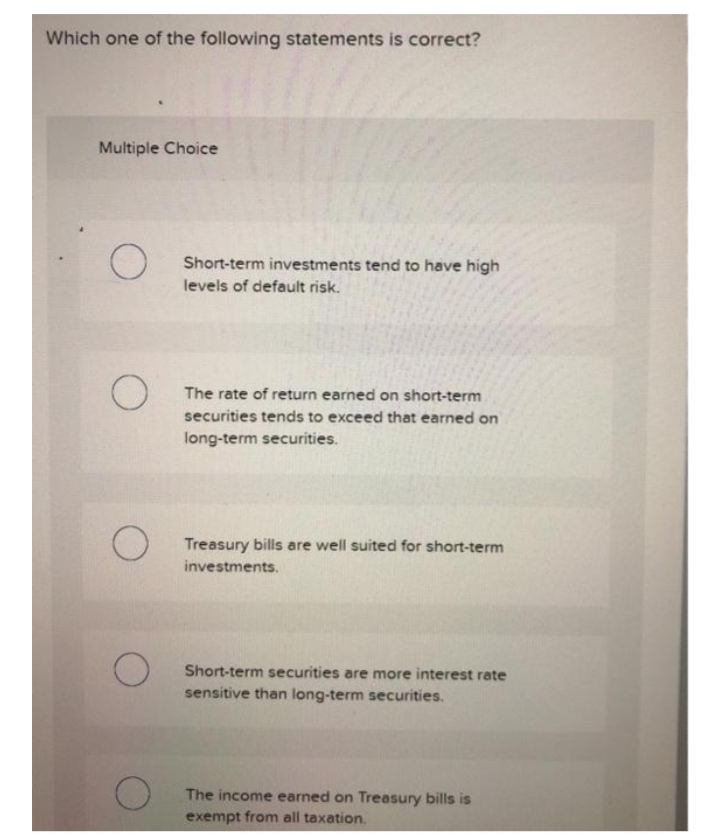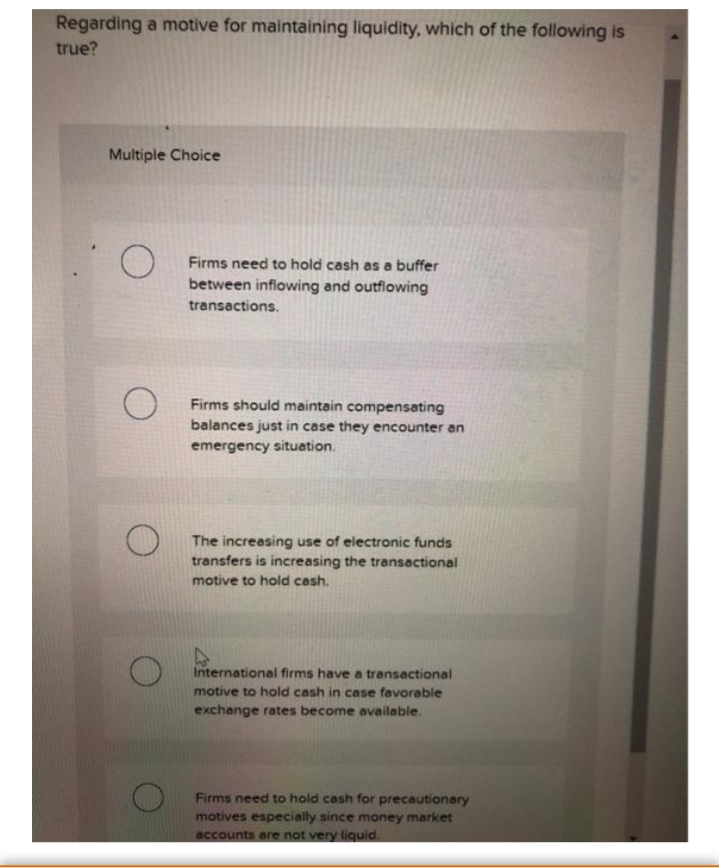Which one of the following statements is correct? Multiple Choice Short-term investments tend to have high levels of default risk. The rate of return earned on short-term securities tends to exceed that earned on long-term securities. Treasury bills are well suited for short-term investments. Short-term securities are more interest rate sensitive than long-term securities. The income earned on Treasury bills is exempt from all taxation.
Which one of the following statements is correct? Multiple Choice Short-term investments tend to have high levels of default risk. The rate of return earned on short-term securities tends to exceed that earned on long-term securities. Treasury bills are well suited for short-term investments. Short-term securities are more interest rate sensitive than long-term securities. The income earned on Treasury bills is exempt from all taxation.
Financial Reporting, Financial Statement Analysis and Valuation
8th Edition
ISBN:9781285190907
Author:James M. Wahlen, Stephen P. Baginski, Mark Bradshaw
Publisher:James M. Wahlen, Stephen P. Baginski, Mark Bradshaw
Chapter10: Forecasting Financial Statement
Section: Chapter Questions
Problem 6QE
Related questions
Question

Transcribed Image Text:Which one of the following statements is correct?
Multiple Choice
Short-term investments tend to have high
levels of default risk.
The rate of return earned on short-term
securities tends to exceed that earned on
long-term securities.
Treasury bills are well suited for short-term
investments.
Short-term securities are more interest rate
sensitive than long-term securities.
The income earned on Treasury bills is
exempt from all taxation.

Transcribed Image Text:Regarding a motive for maintaining liquidity, which of the following is
true?
Multiple Choice
Firms need to hold cash as a buffer
between inflowing and outflowing
transactions.
Firms should maintain compensating
balances just in case they encounter an
emergency situation.
The increasing use of electronic funds
transfers is increasing the transactional
motive to hold cash.
International firms have a transactional
motive to hold cash in case favorable
exchange rates become available.
Firms need to hold cash for precautionary
motives especially since money market
accounts are not very liquid.
Expert Solution
This question has been solved!
Explore an expertly crafted, step-by-step solution for a thorough understanding of key concepts.
This is a popular solution!
Trending now
This is a popular solution!
Step by step
Solved in 2 steps

Knowledge Booster
Learn more about
Need a deep-dive on the concept behind this application? Look no further. Learn more about this topic, finance and related others by exploring similar questions and additional content below.Recommended textbooks for you

Financial Reporting, Financial Statement Analysis…
Finance
ISBN:
9781285190907
Author:
James M. Wahlen, Stephen P. Baginski, Mark Bradshaw
Publisher:
Cengage Learning

Intermediate Financial Management (MindTap Course…
Finance
ISBN:
9781337395083
Author:
Eugene F. Brigham, Phillip R. Daves
Publisher:
Cengage Learning


Financial Reporting, Financial Statement Analysis…
Finance
ISBN:
9781285190907
Author:
James M. Wahlen, Stephen P. Baginski, Mark Bradshaw
Publisher:
Cengage Learning

Intermediate Financial Management (MindTap Course…
Finance
ISBN:
9781337395083
Author:
Eugene F. Brigham, Phillip R. Daves
Publisher:
Cengage Learning
